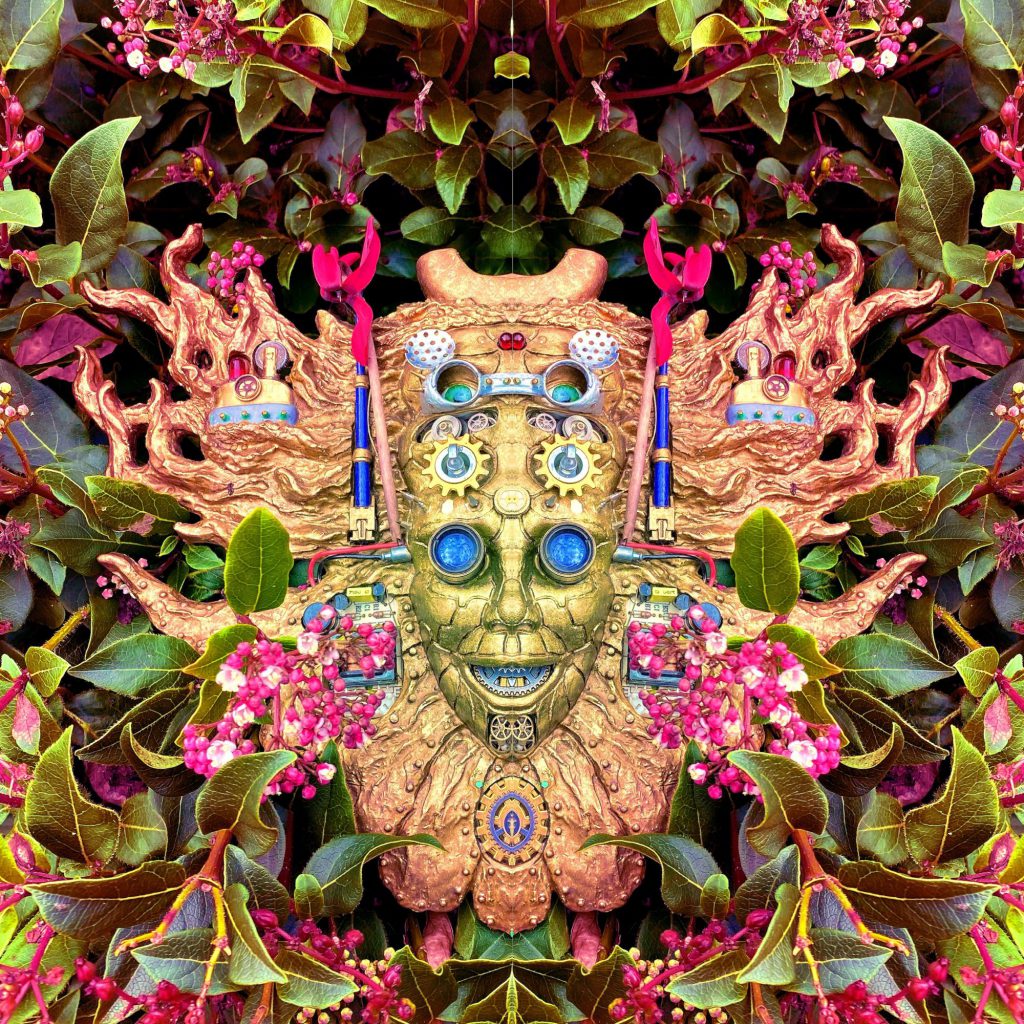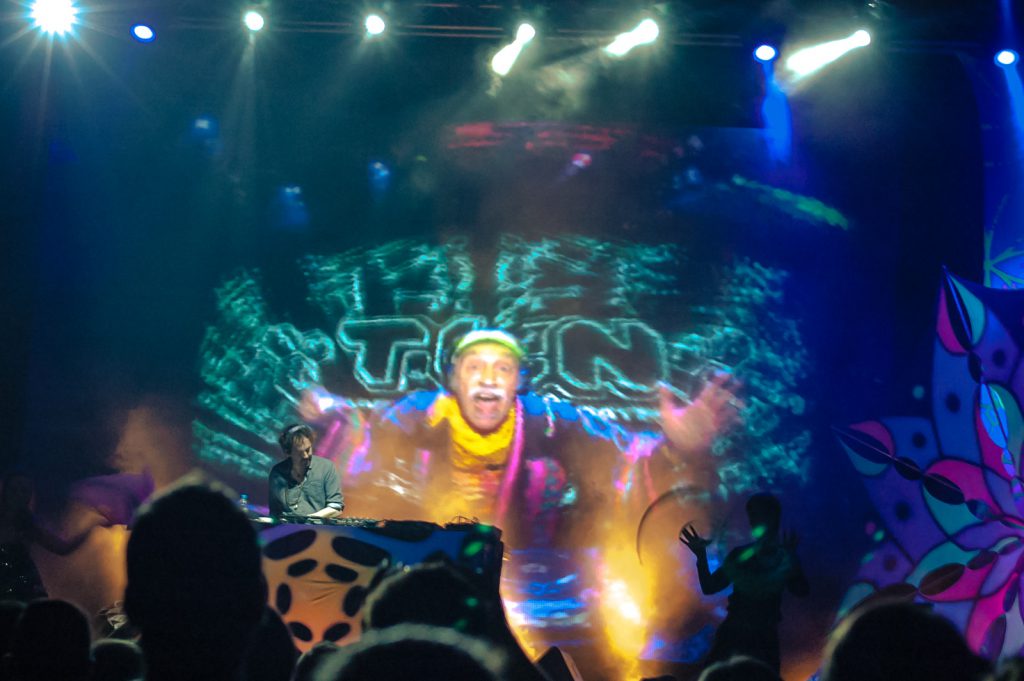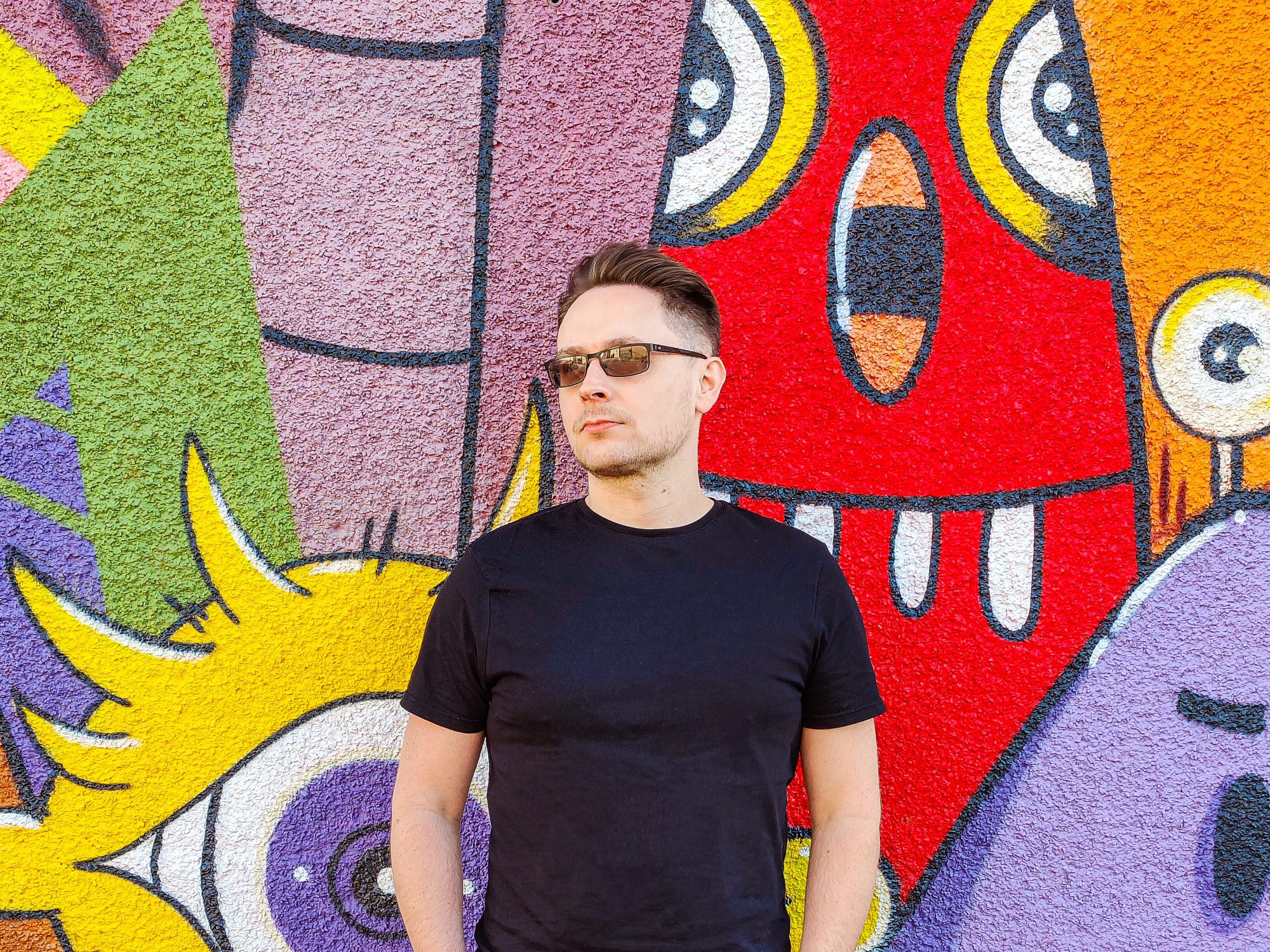Psychedelic music makers Shpongle tell us all about their craft and their relationship with psychedelics may not be what you think!
UK-based Simon Posford (Si) and Raja Ram (Raj) are the core of the living, breathing organism we know as Shpongle. So much individual talent goes into their creations resulting in music and shows that go well beyond the two founders, requiring many others to pull off the final product. Yet the bond between the founders, and pure love of their craft, is what makes Shpongle so unique.
Recently they released the Carnival Of Peculiarities EP and it is both purely Shpongle, yet also a departure that longtime fans are sure to notice. This release is a single example of a larger theme between the founders – how they each push boundaries to explore new directions while the other is ready to reign it in when needed. These two artists balance each other in a natural way that is hard to find in independent creative types like musicians – and Shpongle has done this successfully for a quarter-century now. Pretty impressive!
Luckily, we had the chance to chat with these two creatives and jumped at the opportunity. The discussion is packed with exploring their evolution, as well as how psychedelic culture plays a significant role in their music, but it isn’t about substances. As Simon puts it, psychedelic culture is about expanding the mind and that can be achieved in different ways, many of which do not involve chemical substances. The culture becomes a virtuous cycle where Shpongle can tap into other artistic creations to inspire their music which may then inspire other artists to create and so on.
Give their new EP a listen below or on your favorite platform, and read on for the full interview with Shpongle for a breath of fresh air in an otherwise often repetitive industry.
Stream Shpongle – Carnival Of Peculiarities on Spotify:
Hey Simon and Raj, it’s great to talk to you both today! While I have a deep fondness for Shpongle, my connection doesn’t date back to your origins. Can you tell us how you met and formed Shpongle back in 1996?
Simon Posford: Well, you’ll hear two different stories. I’ll let Raj go first and then I’ll tell you the truth.
Raja Ram: Nah, I’ll let Simon tell you the fantasy version first!
S: [Laughs] We met at Butterfly Studios which belonged to the producer Youth who was in Killing Joe and also produced the last Floyd album. I passed this mad-looking, sort of cartoon Dali creature on the stairs and said, “who the fuck is that?” The nice thing about these studios, we would all meet for lovely Indian vegetarian food dinners and get chatting. Raj was throwing parties in London at the time and this was the early years of the burgeoning trance scene, what became the psytrance scene. We had crossed paths at parties and then made a bit of psytrance together, along with his partner Graham Wood.
Then we were at Glastonbury Festival, having a whale of a time, and we might have ingested certain things, or not, and Raj said to me “Ah, Si, I’m really shpongled!” It was a sort of mixture of words that he was trying to say, like stoned, mong, spangled – all these words that just kind of fell out as one. I thought, “Ah, that’s, that’s good! We should use that for a band name!”
Later we had this wonderful experience watching this Celtic harp player. It was a fantastic moment and a very peaceful, serene vibe. At that moment we decided when we go back to the studio we’ll pause all this trance dance floor hectic music and do something that captures this serene moment. Not worrying about the dance floor or what other people think. Let’s make music that we want to hear that doesn’t necessarily have to be for the dance floor. That’s my version of how Shpongle started.
R: My God, I nearly fell asleep listening to that! It was so inaccurate, I don’t even know where to start. I mean, first of all, 96 was when we did the Glastonbury thing, but we’d had years of recording together before that. But that was way after I met him, which was earlier in the 90s when I saw this young, handsome guy in the studio. We struck up a conversation and we had a lot in common, so we started recording together. But basically, the story is correct and the Glastonbury thing was a turning point. When we went into the studio, we did “Rumours of Vapour” it was sort of like we surprised ourselves.
The artistic styling of Shpongle is undoubtedly psychedelic, and while attention on psychedelics is on the rise lately, its heyday was inarguably in the 1960s. One of you lived through this period and the other wasn’t even born yet. How have these different experiences, and the generational differences, played into your music and live show productions?
R: When I was living in New York at that time they were handing out acid on sugar cubes. Timothy Leary hadn’t even been around yet. I started experimenting in New York and taking this acid which was completely legal. I started to think about consciousness. And that’s part of Shpongle’s mission – to tickle the amygdala to get the consciousness going. We went into a realm that we didn’t understand ourselves. It was like sort of being cast adrift in a small boat at midnight, with no compass, and there was a storm. But somehow, Simon, unlike the guy in the Titanic, pulled me up, and we drove that raft together to the next level.
S: That’s exactly how it happened. [Both Laugh]
Well, when consciousness connects, everything aligns, right?
S: Precisely. I mean, what is psychedelic? At it’s in its most basic form, it’s mind expanding. That’s something we’ve always been interested in, whether it’s expanding your mind, spiritually, chemically, or, however. That’s what the music aims to support.
That’s a perfect segue because a lot of attention around Shpongle focuses on psychedelics, and the connection is valid. However, you’re on record as not using substances during music creation or performance, and that you want to curate that type of experience on its own. What are the other influences that help you reach this goal?
R: Just one minute, Jared? Who said that? I want to see the quote! [Laughs] You know, I’ve always been an advocate, but not a proselytizer. We thought acid was going to change the world and everyone was going to be a solicitor and change the laws. And now you’ll see it sort of happening in America, you’ve got a much more liberal attitude. So things are loosening up, slowly.
S: Again, the music is mind-expanding. If we can just take it back to that, then that is basically the core thing. Raj was in a band in the 60s, Quintessence, that was doing exactly that – spiritually mind-expanding music.
R: It’s not all fun and games, like, let’s have a trip and have fun! It’s hours and hours of exploration and tending the hemorrhoids of love. That’s not easy to do with all the distractions and noises of life.
How did Carnival of Peculiarities come to be? How did this carnival theme come into play?
S: We first wrote “Dr. Vinklestein Says” which is the third track of the EP and I initially wrote it to make my ex-girlfriend’s son laugh. I was reminded of the gait of my dog, the way he sort of trots along like a lurch. So I’d start playing that carnival sound – “um bah um bah um bah” as he walked in and it made us all laugh.
We had the Red Rocks gig coming up and we wanted to do this show as a psychedelic circus. You know, all kinds of crazy audio and visual stuff. I wanted to make that piece quite circusy with things flying out everywhere and sounds coming out of nowhere left and right. That craziness was the seed and that was the first track that we wrote. We had Sylvan Carton, who plays with Beats Antique, and he is just so astoundingly good at all instruments. He plays all the clarinets and saxophones and all that stuff.

Carnival of Peculiarities EP is only three songs, yet it’s over 25-minutes in length. I can think of some LPs that are barely that length and these tracks seem true to your comprehensive “storytelling through sound” style. How do you decide that each song’s story has been told? Do you keep track length in mind?
R: Well, there are many versions to each track – there must have been 10 different versions to each story. We were thinking about a small canoe going down the Amazon passing little villages as the beginning of the EP. On the river banks they were having Ayahuasca ceremonies with exotic birds flying past and we met the tribes and we danced with them.
So the track starts to open up with sounds like a lotus flower. Then you hear the beat and the drums and the animals, everything becomes organic and the mushrooms start talking, too. The whole thing is sort of like a trip down something to go to another destination and we finally get to that destination. Then Simon adds this idea of a Jewish wedding on acid. You have to strap me down if I hear it because something happens to the neurons that just makes you dance! He followed it through and played it amazingly.
But it’s a departure from Shpongle and I think a lot of people are gonna say, what’s happened to Shpongle? It’s not the Shpongle I knew six albums ago. Every album with Si and me has been a blank canvas and we start with just a dot. Sometimes we end up with just a dot! Sometimes it works and sometimes it doesn’t work. I just feed that activity as much as possible by being a rebel, you know, irreverent – or maybe irrelevant is more like it!
S: Raj has some pretty hot flute playing on this new one. I have to say, certainly some of your best work.
R: Well, my best work is only attainable by you, because you make me sound good! It’s like you just bring out the best because you push me so hard. Then, technically, the way you record it, the way you process it, the little delays, the little nuances. It’s like a presentation signature dish with your, all your styles. And I mean, without you I’d really lost in the negative.
This EP has a beautiful balance between the very natural and organic themes often present in your and something more synthesized and melodic, too. Did you set out with that goal in mind or is this what came out of something less structured?
S: A little bit of both. Like you say, the organic with the electronics, that has always been Shpongle’s strong points. One of our features is the way we integrate organic, real instruments with electronics. From the early days, we were using live drums and it was hard to get live drums with electronic music because it needed to be tight and quantized. We were doing stuff like that before you could even quantize. Now we have so many great musicians from Pete Callard on guitar, Harry Escott on cello, and our vocalist Michele Adamson, all on the new EP. That’s always been a part of Shpongle – mixing that organic human element with electronics. That’s sort of our superpower – mixing those genres into a new homogenous thing that doesn’t sound like any of them really.
R: You mentioned that evolution important and you either evolve or dissolve and most musicians crumble by their third album. It’s really hard to come up with a fifth and let alone a sixth. This EP has something we haven’t done in the past which is much more of a jazz flavor. I’m a jazz musician, at least always aspired to be and studied jazz. But when I say jazz, it’s not that this EP is jazz, obviously, but there are certain elements. For instance, it’s very unusual for Shpongle to use an extended chord pattern. Yet this time you’ll notice the chord patterns are quite evolved. There are various time signatures, they really can throw you so It almost feels like you’re on a ship going out of time backward through the cosmic mirror.
Si sets the framework so it’s possible for me as a flute player to improvise and Si repairs all the damage later. But basically, this is a challenge for us to be able to go into almost another genre, whether it’s opera, or jazz, or very, ultra ambient. We’re exploring all of these things because they’re our emotions. And we feel we play very much with our emotions and consciousness. And that’s why we’ve always done this music for ourselves, basically. Haven’t we, Si?
S: Yeah, that’s always the only rule for Shpongle – we just do something that we like and that we want to hear.
R: And then maybe give it the acid test, anyhow. [Laughs]
The producers I talk to that say, “I’m making music for myself, whether it fits into a genre or not,” are the ones that seem to have longevity. You seem to be on that path as well.
S: I like to think that our taste in music is broad enough that the music we want to hear isn’t going to be so weird and avant-garde that it’s going to put everybody off. There will be many like-minded souls who are looking to hear exactly the same thing that we want to hear.
R: Our essence is “music to have fun to” in any situation. Hopefully, it takes you away from yourself and your problems. We’re setting a very high standard between ourselves and we reject a tremendous amount of material. We’re never happy. I mean, I’m not happy, entirely happy with everything on the EP or every inflection, but we get as close as we can until we move on to record soon something else.

Simon, you once said that “Breakfast in America” by Supertramp is some of the least trippy music you’ve enjoyed. Like you, that’s an album I grew up with. How did this and other early music listening steer you to the music you produce today?
S: I don’t know how much the sort of music I listened to when I was ten or eleven still has an influence. But I guess there’s a little bit of everything in there. You can’t help but soak up all these influence influences from everything you hear – snippets of conversation, albums, movies, and stuff. It all fills the well of inspiration
R: You mean we rip everybody off?!?
The essence of art is balancing theft with creation.
R: I like that, I need to remember that one! Nothing’s new under the sun. How is it possible we have this world music all around as brilliant musicians, incredible bands, and they’re all on this tiny little spectrum of notes yet everybody can be individualistic, like a fingerprint or a snowflake?
A lot of people have used psychedelics and surrounding culture, like your music to help cope with our pandemic times. What has kept you guys grounded? What has helped you get through this last year?
S: I’m very lucky. I live in a beautiful house with a garden and I’ve got a dog. So my daily life is just going out into the woods walking the dog. We were lucky to have a hot summer, and a hot spring. So I’ve just been growing things in the garden and going back to nature and to myself. That combined with creativity.
I also had a solo album out during the lockdown. I just played around in the studio and I wasn’t expecting or planning to make an album. But suddenly after all these hours of sitting around here, I said, “Oh, I guess that’s sort of an album worth, so let’s put it out!” Creativity can get you through hard times as any poor starving artist will attest. I’m sure that creativity really feeds the soul somehow.
R: Ah, soul yes. Well, I have a different approach to all of that. I have to say, nothing is something worth doing, as we all know! I have been in this house for a year now after my last gig in Brazil. I have only been out to take the rubbish twice. I swear! I have not left this house, this neighborhood, this street, nothing. And how do I pass my time? I don’t really know how I passed the time. It just passes every day. I say it’s another Friday, Shalom! I’m really appreciating the world. I’ve got a beautiful house. My wife is here. I see my family on occasion. It’s the best! This lockdown has been, absolutely, number one!
That is fantastic.
S: Don’t forget, as musicians, Raj and I had been DJing and traveling so much. You don’t get a lot of time to settle in at home and really get into a project or anything before you have to go pack your gear up and go off to play a gig somewhere. So I think it’s been nice for both of us to not be on the hamster wheel of gigs.
R: I’ve also been getting back into oil painting every day and stuff like that. You find yourself leaning towards different things, listening to music, listening to what other people suggest to us – a whole plethora of incredible music out there. It really is a turn-on to have the time to listen to it all.
Aside from sharing your magical creations live in a post-pandemic world, what’s something else you are really looking forward to when we can behave more freely once again?
S: Having a hug!
R: Yeah, and seeing my grandchild more often. You know, all those things you take for granted. It’s like when we have a meal all together. Now you appreciate everything every second, every nanosecond because you just don’t know what’s gonna go next.
Well, that was my final question. You guys are wonderful. I really appreciate this and the love for your art and each other is so obvious here. It’s beautiful.
R: Thank you, Jared. Before we sign off, I’d like to thank all our fans and people and friends and family and all our American Shpongloids. I don’t get to know or see or meet you all. But I know in that realm of disembodied consciousness, we’re all rocking to the big tune and we will meet somewhere sometime. In the meantime, it’s a giant cosmic hug for the whole world!
S: What he said! [Laughs]
Follow Shpongle on Social Media:
Website | Facebook | Twitter | Instagram | SoundCloud | YouTube








